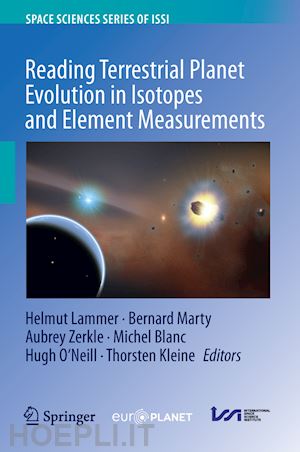
Questo prodotto usufruisce delle SPEDIZIONI GRATIS
selezionando l'opzione Corriere Veloce in fase di ordine.
Pagabile anche con Carta della cultura giovani e del merito, 18App Bonus Cultura e Carta del Docente
Preface to Reading Terrestrial Planet Evolution in Isotopes and Element Measurements [THIS SHOULD BE RENAMED FROM THE CURRENT EDITORIAL].- The Sun through time.- Chemical and isotopic evolution of the early Solar System.- Formation of Venus, Earth and Mars: Constrained by isotopes.- Geochemical constraints on the origin of the Moon and preservation of ancient heterogeneities.- On the distribution and variation of radioactive heat producing elements within meteorites, the Earth, and planets.- Loss and fractionation of noble gas isotopes and moderately volatile elements from planetary embryos and early Venus, Earth and Mars.- Nitrogen atmospheres of the icy bodies in the solar system.- Perspectives on atmospheric evolution from Xe and nitrogen isotopes on Earth, Mars and Venus.- Mission to Planet Earth: the first billion years.- The isotopic imprint of life on an evolving planet.- Future missions related to the determination of the elemental and isotopic composition of Earth, Moon and planets.- SI 1: Earth's Nitrogen and Carbon Cycles.- SI 2: Relative atomic Solar System abundances, mass fractions, and atomic masses of the elements and their isotopes, composition of the solar photosphere, and compositions of the major chondritic meteorite groups











Il sito utilizza cookie ed altri strumenti di tracciamento che raccolgono informazioni dal dispositivo dell’utente. Oltre ai cookie tecnici ed analitici aggregati, strettamente necessari per il funzionamento di questo sito web, previo consenso dell’utente possono essere installati cookie di profilazione e marketing e cookie dei social media. Cliccando su “Accetto tutti i cookie” saranno attivate tutte le categorie di cookie. Per accettare solo deterninate categorie di cookie, cliccare invece su “Impostazioni cookie”. Chiudendo il banner o continuando a navigare saranno installati solo cookie tecnici. Per maggiori dettagli, consultare la Cookie Policy.